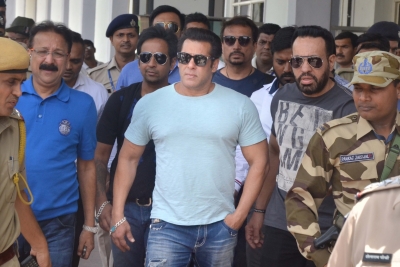Rajasthan HC hears two crucial pleas in Salman Khan’s blackbuck poaching case
Jaipur, Sep 23 (IANS) The long-running blackbuck poaching case, which has spanned over two decades, returned to the spotlight on Tuesday as the Rajasthan High Court heard two crucial petitions — one filed by Bollywood actor Salman Khan challenging his conviction, and the other by the state government seeking permission to appeal the acquittal of the co-accused.
The matter was heard in the court of Justice Sandeep Shah, but due to a request from the public prosecutor for more time, the court adjourned the hearing. The next date has been scheduled eight weeks from now.
The case dates back to October 1998, during the shooting of the Bollywood film ‘Hum Saath Saath Hain’ near Kankani village in Jodhpur. Salman Khan was accused of poaching a blackbuck, an endangered species protected under the Wildlife Protection Act. The case was filed after a complaint by members of the Bishnoi community, which holds the blackbuck sacred and has played a major role in pursuing justice. On April 5, 2018, the Chief Judicial Magistrate (CJM) court in Jodhpur found Salman Khan guilty under the Wildlife Protection Act. He was sentenced to five years in prison and fined Rs 25,000.
However, five other co-accused — Saif Ali Khan, Tabu, Sonali Bendre, Neelam, and Dushyant Singh — were acquitted due to lack of evidence. All the actors had been questioned multiple times over the years as the case progressed through various courts. Today’s hearing involved two major petitions: Salman Khan’s appeal challenging his conviction and seeking acquittal, and the state government’s Leave to Appeal, which was a request to appeal the acquittal of the other co-accused.
Since “leave to appeal” is not automatically granted in cases where the accused has been acquitted, the state government must first obtain the court’s permission before an appeal can move forward.
“The government believes the acquittals were unjustified and wants the High Court to re-examine the evidence,” said a legal source familiar with the matter.
Both petitions were considered together for judicial efficiency, but further arguments will now take place after the court’s eight-week adjournment.
This year, the first hearing took place on February 14. Given the complexities of the case, the court scheduled the next hearing for April 15. In the second hearing on May 16, the court ordered the case to be listed on July 28, along with Salman Khan’s appeal. The third hearing took place on July 28. Salman Khan’s appeal against his conviction before the District Sessions Judge, Jodhpur, was also ordered to be registered in the High Court and listed for hearing on September 22.
The matter will now resume later this year, unless further delays occur.
In the aftermath of the 1998 incident, the Bishnoi community — known for its strong conservation values — not only pursued the case relentlessly but also demanded a memorial at the site where the blackbuck was killed. That memorial has now been constructed and stands as a symbol of the community’s deep connection to wildlife protection.
Meanwhile, in legal terms, “leave to appeal” means seeking special permission to file an appeal — especially in cases where someone has been acquitted. This is necessary because the right to appeal is not automatic for the prosecution. The High Court must be convinced that there is sufficient legal ground to revisit the lower court’s judgment. If the court grants leave, the case is converted into a regular appeal, and full arguments on the merits of the case can be heard.
–IANS
arc/dpb



Comments are closed.